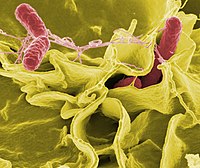
Photo from wikipedia
Engineered Salmonella secreting heterologous bacterial flagellin suppress tumor growth by activating intratumoral macrophages. Two bacteria can be better than one In some cases, injecting tumors with specific bacteria can help… Click to show full abstract
Engineered Salmonella secreting heterologous bacterial flagellin suppress tumor growth by activating intratumoral macrophages. Two bacteria can be better than one In some cases, injecting tumors with specific bacteria can help eradicate the tumors by stimulating inflammation and triggering an antitumor immune response. A classic example of this is injection of bladder cancer with bacillus Calmette-Guérin, but more recent approaches have used bacteria such as Clostridium and Salmonella species. Building on the idea of antitumor bacterial therapy, Zheng et al. engineered a weakened strain of Salmonella typhimurium to produce the flagellin B protein from another bacterium, Vibrio vulnificus. The engineered bacteria induced an effective antitumor immune response, successfully treating tumors in several different mouse models with no evidence of toxicity. We report a method of cancer immunotherapy using an attenuated Salmonella typhimurium strain engineered to secrete Vibrio vulnificus flagellin B (FlaB) in tumor tissues. Engineered FlaB-secreting bacteria effectively suppressed tumor growth and metastasis in mouse models and prolonged survival. By using Toll-like receptor 5 (TLR5)–negative colon cancer cell lines, we provided evidence that the FlaB-mediated tumor suppression upon bacterial colonization is associated with TLR5-mediated host reactions in the tumor microenvironment. These therapeutic effects were completely abrogated in TLR4 and MyD88 knockout mice, and partly in TLR5 knockout mice, indicating that TLR4 signaling is a requisite for tumor suppression mediated by FlaB-secreting bacteria, whereas TLR5 signaling augmented tumor-suppressive host reactions. Tumor microenvironment colonization by engineered Salmonella appeared to induce the infiltration of abundant immune cells such as monocytes/macrophages and neutrophils via TLR4 signaling. Subsequent secretion of FlaB from colonizing Salmonella resulted in phenotypic and functional activation of intratumoral macrophages with M1 phenotypes and a reciprocal reduction in M2-like suppressive activities. Together, these findings provide evidence that nonvirulent tumor-targeting bacteria releasing multiple TLR ligands can be used as cancer immunotherapeutics.
Journal Title: Science Translational Medicine
Year Published: 2017
Link to full text (if available)
Share on Social Media: Sign Up to like & get
recommendations!